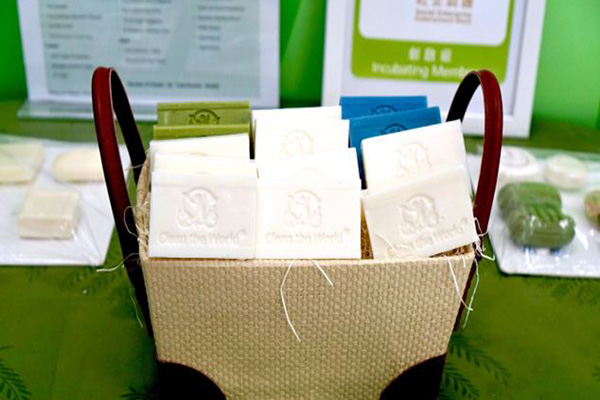Soap, health & hygiene have a huge impact on our world, yet the hotel industry is tossing a million bars of soap every day.
You might be scratching your head thinking, “What did he just say?”
.
You understood correctly. Today I’m talking about recycling hotel soap.
.
Now, in this podcast, I’m going to do something a little different.
.
A few months ago, I read a story that has stuck with me and I have been planning to share it with you for a while but was not quite sure how I wanted to do it.
.
Well, I have decided to share it just as I read it. I am going to read the story to you.
.
It was presented a few months back on CNN’s Business Traveller by Kate Springer and it was called
.
“The Company Cleaning Up the World’s Biggest Hotels”
.
Next time you check out of a hotel, spare a thought for the barely touched bar of soap left behind in your room.
.
Around the world, five million hotel soaps make their way to landfills every single day.
But Clean the World aims turn those discarded slabs into a life-changing commodity.
.
With recycling centres in the United States and Hong Kong, the not-for-profit corporation has partnered with 5,000 hotels internationally to recycle soap from nearly one million hotel rooms daily, distributing them instead to families, schools and organizations in need.
.
Why? UNICEF estimates that 1.4 million children a year die from diseases such as pneumonia and cholera, easily preventable with better hygiene.
.
“Soap and health and hygiene have a huge impact in our world,” founder Shawn Seipler tells CNN.
“Soap impacts health. Soap impacts one’s environment. Soap impacts economic issues. Soap impacts the rate at which infectious disease spreads.”
.
.
Confessions of a Frequent Flyer
Before starting Clean the World in 2009, Seipler was like most business travellers.
.
As the vice president of a global technology company, he travelled constantly, staying no more than a few nights at a time at any given hotel.
.
Again and again, he noticed that his hotel soap disappeared overnight, even if he’d hardly touched it.
.
“One day, I called the front desk at the hotel I was staying at and asked them what happened to the soap when I was done with it. They said it was discarded,” recalls Seipler.
.
He did some research and discovered that the hotel industry was tossing a million bars of soap every day.
.
Seipler didn’t immediately know how or what he would do with this information, but further investigation led him to an important connection.
At the time, he found that nine million children died every year from pneumonia and gastrointestinal diseases.
.
“Countless studies showed that if we gave these children soap and talked to them about how and when to wash their hands, we could cut those deaths in half,” says Seipler.
.
“With the amount of soap we were throwing away globally, I was surprised that nobody had put this together before us.”
.
.
Scrubbing In
Seipler learned how to recycle soap, but the operation was scrappy at first.
.
“My family and I established a recycling centre in a single car garage in downtown Orlando, Florida,” Seipler recalls.
.
“We all sat around on upside-down pickle buckets, with potato peelers. We would scrape soap, had a meat grinder to break it down, and cookers to melt it. We had wood soap moulds and racks to fan down the soap when it was done re-badging (adding logos).”
.
The power would cut out in the house every 30 minutes, and the police even stopped by once with a few suspicions.
.
“That was our first factory. All day at work and we would make 500 bars of soap,” Seipler says.
.
They eventually ramped up the process after establishing their first major hotel partnership, with Marriott International, and logistics partnerships with UPS and Guest Supply, a supplier of hotel room toiletries.
.
.
Expanding to Asia
In 2014, Clean the World expanded its footprint to Asia, home to some of the world’s most impoverished communities.
.
“There are millions of hotel rooms in Asia and there is a tremendous need for soap, especially in areas of Southeast Asia and in India,” says Seipler.
.
With a recycling factory in Hong Kong, the organization partnered with some of the largest brands in Asia, including The Mandarin Oriental, The Peninsula Hong Kong, InterContinental Grand Stanford Hong Kong and Sands China.
.
One of the earliest regional partners, The Venetian Macao — the largest casino in the world — has diverted approximately three million bars, making it one of the largest contributors.
.
“I don’t think most people realize that there are people around the world dying because they don’t have access to basic hygiene such as being able to wash hands with soap,” Syed Mubarak, director of sustainability for Venetian Macau, tells CNN.
.
“My feeling is that awareness of the environment, of recycling and of waste handling have increased in general in Asia, and in the hospitality sector.”
.
Seipler says the main pushback from hotels is the cost — about $1 per room, per month.
.
This fee, he says, includes collection, logistics, impact reports, recycling and re-distribution to charities across Asia that give soaps with hygiene education to under-served communities.
.
.
Squeaky Clean Soap
In a 1,200-square-foot factory in Hong Kong, the organization scrubs, sorts and recycles 50,000-60,000 bars of soap, or 50 to 60 tons, a month.
.
The process begins with a thorough cleaning, where volunteers scrape soap free of hair and fibres.
.
Then it’s on to sorting: Holiday Inn Macau’s oatmeal bars, Aloft Taipei’s bright blue soaps, and the W’s green suds stay together, while more generic white soaps can mix and mingle.
.
“This step is important because some of the soaps are harder than others. If a soap is harder, it takes longer to process,” factory director Alex Chin tells CNN. “So it’s more efficient to mix together soft and hard soaps.”
.
From there, the soap is crushed and shaved into pretty ribbons, nicknamed “soap noodles,” then sterilized.
.
The last step requires further pummeling until the soap is broken down into an almost chalky texture.
.
A powerful mixer churns soap into a rectangular mould and stamps it with a fresh Clean the World logo — squeaky clean and ready for a new home.
.

.
I liked that story.
.
If you have any stories about recycling hotel soap or of any ways of giving back would like to share or have any questions or feedback you can leave them in the comments section of the show notes.
.
.
..
With this in mind, we want to challenge you.
We want to challenge you to the 6 Day Challenge.
.
We at Keystone HDC have taken our years of experience as hospitality property authorities and have produced the
.
.
A video series with many actionable tips & techniques that you can take and use to help improve your properties patronage and profit.
.
And the most exciting thing with this video series– it’s 100% Free!
.
This 6 Day Challenge will take you step by step through the process of operating a successful hospitality property, including:
.
- Determining What Type of Owner/Manager You Are
- How to Set Up an Organisational Structure
- Secrets to Great Customer Service
- How to Market Effectively
- How to Benefit From Social Media
- How to Make Your Guests Want to Return
.
.
Whether you are operating a one-room bed & breakfast or a 500 room luxury hotel, there is always something new you could learn.
.
As a famous quote says
.
“Never stop learning, because life never stops teaching”
.
It is important as a hospitality property owner or manager that you never stop learning.
.
So, what have you got to lose? Are you up for the challenge?
.
Visit
keystonehospitalitydevelopment.com/6-day-challenge-log-in-here
.

